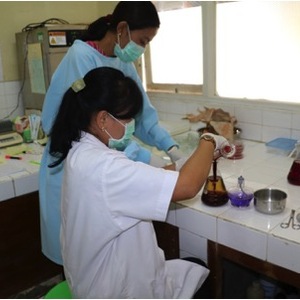Microbiology/Pathology

Pathology is the medical specialty based in the laboratory that determines the cause and nature of diseases. Medical laboratories help doctors and other health professionals analyse patient samples to assist them with a diagnosis and to guide treatment.
FOHG has been supporting the Clinical Pathology Department at Professor Johannes Hospital since 2011. The different disciplines within the clinical pathology laboratory include Clinical Microbiology, Haematology, Clinical Biochemistry and Transfusion Medicine. A separate Anatomical Pathology lab was set up in Prof Johannes Hospital in 2016.
Clinical Microbiology
Clinical Microbiology or Medical Microbiology is to do with diagnosing infections, diseases caused by germs. These include bacteria, viruses, fungi and parasites. Many bacteria especially in developing countries are getting more resistant to the antibiotics available to treat them. The Microbiology lab can help diagnose these infections and help determine the best antibiotic for the doctor to use for the particular patient. Accurate and timely results are a significant challenge for the laboratory.
Several Medical Scientists from around Australia have volunteered their time to upskill the staff in the laboratory in Prof Johannes Hospital. This is done through one-on-one teaching, demonstration of techniques and also providing reference and teaching materials. With modern communication, on-going contact via WhatsApp also help!
This has helped increase the lab analysts’ knowledge base and improve their procedures. Efficiencies have been created in the department to reduce media contamination and implement quality control procedures.
A particular highlight was inviting Prof Amin Soebandrio in 2016 to help kick off the introduction of the WHONET surveillance software in the lab to enable better monitoring of resistance rates in the Hospital. The laboratory has also been able to assist with Infection Control investigations within the hospital.
An important focus for the lab has been on antibiotic (anti-microbial) resistance and developing an understanding of how this can be managed along with the introduction, in conjunction with the Pharmacy Department, of an antimicrobial stewardship program.
As part of broader education, we have also held workshops for doctors and other health professionals in Infections Management and better use of the Microbiology laboratory services. Additionally we have also given lectures at the Kupang Health Polytechnic (Poltekkes Kemenkes Kupang) to students in the Health Analyst course who will be the lab analysts across NTT province after graduation.
Future plans for this area are expanding and it is hoped in the future that FOHG will help in upskilling analysts in NTT in relation laboratory diagnosis of Malaria through a “Train the Trainer” model.
Haematology & Transfusion Medicine
FOHG has supported Dr Ita and Dr Rany, Clinical Pathologists from Professor Johannes Hospital, to come to Perth, Western Australia to participate in the UWA one week intensive Introduction to Laboratory Haematology Course organised by Dr Matthew Wright, Haematologist. This initiative has benefited the knowledge base of these pathologists who have returned to Kupang to mentor other work colleagues and has led directly to a substantial benefit in patient care.
Prof David Roxby from Flinders University in Adelaide has also given a number of Transfusion Seminars in Kupang organised by Dr Samson Teron, the head of the NTT Red Cross Transfusion Services. Participants came from all over NTT province. This has assisted in increasing the knowledge and skills of analysts and doctors in the safe use of blood products in transfusion. This is commonly used for bleeding following childbirth for example.